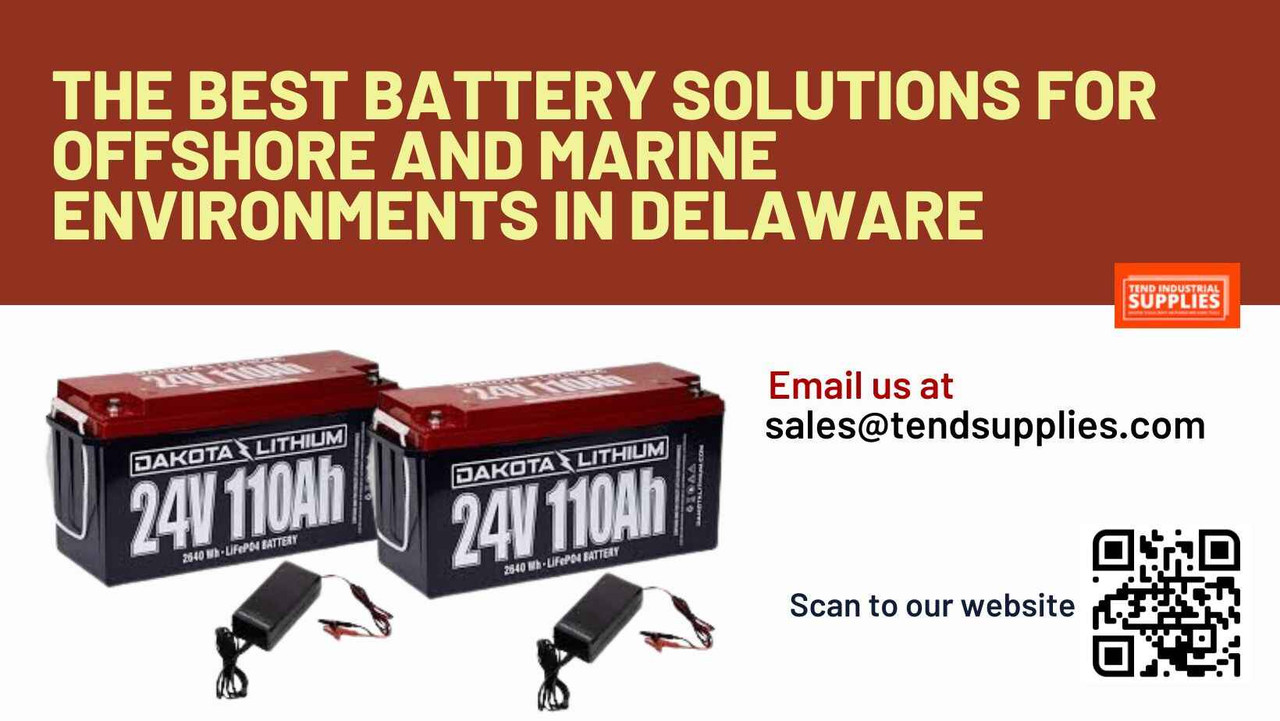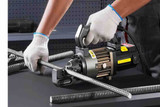The Best Battery Solutions for Offshore and Marine Environments in Delaware
Key Takeaway
Investing in high-quality, marine-grade lithium batteries, such as those offered by Dakota Lithium, can significantly enhance the performance, reliability, and longevity of power systems in Delaware's offshore and marine environments. These advanced battery solutions offer superior power density, longer cycle life, and better resistance to harsh marine conditions compared to traditional lead-acid batteries, making them an ideal choice for a wide range of maritime applications.
Introduction
Navigating the challenges of offshore and marine environments requires reliable power solutions that can withstand harsh conditions such as saltwater corrosion, extreme temperatures, and continuous vibrations. In Delaware, where marine industries and offshore activities play a significant role, having the right battery solution is critical for ensuring safety, performance, and longevity of equipment. This guide provides insights into the best battery solutions tailored for offshore and marine applications, exploring the technologies that deliver dependable power, maintain efficiency, and are designed specifically to meet the unique demands of marine operations. Whether it’s for vessels, offshore rigs, or coastal facilities, finding the right battery can make all the difference in powering success at sea.
This comprehensive guide explores the best battery solutions for offshore and marine applications in Delaware, focusing on the cutting-edge Dakota brand of lithium batteries and other innovative power solutions.
Understanding the Challenges of Marine Environments in Delaware
Delaware's marine environments present unique challenges for battery systems:
- Saltwater Exposure: Corrosive effects of saltwater can damage battery components.
- Temperature Fluctuations: From hot summers to cold winters, batteries must perform across a wide temperature range.
- Humidity: High moisture levels can lead to condensation and potential short circuits.
- Vibration and Shock: Rough seas and boat movements can stress battery systems.
- Limited Space: Many marine vessels have constrained areas for battery installation.
- Safety Concerns: Risk of fire or explosion in enclosed spaces requires stringent safety measures.
Advantages of Lithium Batteries for Marine Applications
Dakota Lithium batteries offer several advantages over traditional lead-acid batteries for marine use:
- Higher Energy Density: More power in a smaller, lighter package.
- Longer Lifespan: Up to 5 times the cycle life of lead-acid batteries.
- Faster Charging: Reduced downtime and increased usability.
- Depth of Discharge: Can be discharged to lower levels without damage.
- Maintenance-Free: No need for water top-ups or equalization charges.
- Safety: More stable chemistry with reduced risk of fire or explosion.
- Environmental Friendliness: No toxic lead or acid, aligning with Delaware's environmental regulations.
Comparison: Lithium vs. Lead-Acid Batteries for Marine Use
| Feature | Dakota Lithium | Lead-Acid | Advantage |
| Cycle Life | 3000-5000 cycles | 500-1000 cycles | Lithium |
| Weight | 50-70% lighter | Heavier | Lithium |
| Charging Time | 1-3 hours | 6-12 hours | Lithium |
| Depth of Discharge | Up to 100% | 50% recommended | Lithium |
| Maintenance | Minimal | Regular | Lithium |
| Cold Weather Performance | Excellent | Poor | Lithium |
| Initial Cost | Higher | Lower | Lead-Acid |
| Long-term Cost | Lower | Higher | Lithium |
Top Dakota Lithium Battery Models for Delaware's Marine Applications
1. Dakota Lithium 12V 100Ah Battery
Ideal for: Small to medium boats, trolling motors, fish finders
Features: 100Ah capacity, 1280Wh energy, built-in BMS
2. Dakota Lithium 12V 200Ah Battery
Ideal for: Larger boats, house power systems, electric propulsion
Features: 200Ah capacity, 2560Wh energy, parallel connection capability
3. Dakota Lithium 24V 100Ah Battery
Ideal for: Electric outboards, larger marine electronics systems
Features: Higher voltage for more powerful applications, compact design
4. Dakota Lithium 36V 50Ah Battery
Ideal for: High-power marine applications, electric boat conversions
Features: High voltage, lightweight, suitable for series connection
5. Dakota Lithium 52V 20Ah Battery
Ideal for: Specialized marine equipment, advanced electric propulsion systems
Features: Very high voltage, ideal for high-performance applications
Choosing the Right Battery for Your Delaware Marine Application
Consider these factors when selecting a battery for your offshore or marine use in Delaware:
- Power Requirements: Calculate your total power needs, including peak loads.
- Space Constraints: Measure available installation space on your vessel.
- Weight Considerations: Factor in the impact on vessel performance and fuel efficiency.
- Charging Capabilities: Ensure your charging system is compatible with lithium batteries.
- Environmental Conditions: Consider exposure to saltwater, temperature ranges, and vibration levels.
- Regulatory Compliance: Check Delaware's marine regulations regarding battery installations.
- Budget: Consider both initial cost and long-term savings.
Best Practices for Marine Battery Installation and Maintenance in Delaware
- Proper Installation:
- Use marine-grade materials for all connections and enclosures.
- Ensure adequate ventilation to prevent heat buildup.
- Secure batteries to prevent movement in rough seas.
- Regular Inspections:
- Check for signs of corrosion or damage, especially after exposure to saltwater.
- Inspect cable connections for tightness and integrity.
- Monitor battery performance and charging patterns.
- Cleaning and Protection:
- Clean battery surfaces with a damp cloth to remove salt deposits.
- Apply dielectric grease to terminals to prevent corrosion.
- Consider using battery boxes or covers for additional protection.
- Charging Best Practices:
- Use a charger specifically designed for lithium marine batteries.
- Avoid overcharging by using a charger with automatic cut-off.
- Charge batteries after each use to maintain optimal performance.
- Winter Storage:
- For seasonal boats, store batteries in a cool, dry place.
- Maintain a partial charge (around 50%) for long-term storage.
- Periodically check and top up charge during storage.
Safety Considerations for Marine Lithium Batteries in Delaware
- Fire Safety:
- Install smoke and heat detectors near battery installations.
- Keep a lithium-compatible fire extinguisher on board.
- Develop an emergency response plan for battery-related incidents.
- Electrical Safety:
- Use marine-grade circuit breakers and fuses.
- Implement proper grounding and bonding practices.
- Regularly inspect electrical systems for signs of wear or damage.
- Environmental Protection:
- Follow Delaware's guidelines for proper disposal of old batteries.
- Have a spill containment plan in case of battery damage.
- Use environmentally friendly battery options when possible.
Innovative Marine Battery Applications in Delaware
- Hybrid Electric Propulsion Systems:
- Combining traditional engines with electric motors for improved efficiency.
- Ideal for Delaware's diverse waterways, from inland bays to offshore areas.
- Smart Energy Management Systems:
- Integrating solar panels with lithium batteries for sustainable power.
- Monitoring and optimizing energy usage through advanced software.
- Electric Fishing Boats:
- Silent operation for improved fishing experience in Delaware's popular fishing spots.
- Reduced environmental impact aligning with Delaware's conservation efforts.
- Offshore Wind Farm Support Vessels:
- High-capacity lithium batteries for extended offshore operations.
- Supporting Delaware's growing offshore wind energy sector.
- Autonomous Marine Vehicles:
- Long-lasting lithium batteries powering research and survey vessels in Delaware's waters.
- Enabling extended missions without the need for frequent recharging.
Case Studies: Successful Marine Battery Implementations in Delaware
- Commercial Fishing Fleet Upgrade:
- Location: Lewes, Delaware
- Challenge: High fuel costs and frequent battery replacements
- Solution: Upgraded to Dakota Lithium 12V 200Ah batteries
- Result: 30% reduction in fuel costs, 50% less downtime for battery maintenance
- Recreational Boating Marina:
- Location: Rehoboth Bay, Delaware
- Challenge: Environmental concerns and noise pollution
- Solution: Implemented hybrid electric systems with Dakota Lithium batteries
- Result: 40% reduction in emissions, improved customer satisfaction due to quieter operation
- Delaware Bay Research Vessel:
- Location: Delaware Bay
- Challenge: Need for extended mission duration and reliable power for sensitive equipment
- Solution: Installed high-capacity Dakota Lithium 24V system
- Result: Mission duration extended by 72%, improved data collection capabilities
Future Trends in Marine Battery Technology
Stay ahead of the curve by keeping an eye on these emerging trends:
- Solid-State Batteries: Offering even higher energy density and improved safety.
- Advanced Battery Management Systems: AI-driven systems for optimal performance and longevity.
- Faster Charging Technologies: Reducing downtime for commercial marine operations.
- Recycling and Sustainability: Improved recycling processes for end-of-life batteries.
- Integration with Renewable Energy: Better synergy with solar and wind power systems on vessels.
Frequently asked questions
1. How long do Dakota Lithium batteries typically last in marine applications?
With proper care, Dakota Lithium batteries can last 5-10 years or 3000-5000 cycles, significantly outlasting traditional lead-acid batteries in marine use.
2. Are lithium batteries safe to use in the confined spaces of boats?
Yes, when properly installed and maintained, lithium batteries are safe for marine use. They have a more stable chemistry than lead-acid batteries and often include built-in safety features.
3. Can I replace my boat's lead-acid batteries with lithium batteries without changing the charging system?
While lithium batteries can often work with existing systems, it's recommended to use a charger specifically designed for lithium batteries to ensure optimal performance and longevity.
4. How do Dakota Lithium batteries perform in Delaware's cold winter temperatures?
Dakota Lithium batteries perform exceptionally well in cold temperatures, maintaining higher capacity and better cranking power compared to lead-acid batteries in Delaware's winter conditions.
5. Are there any special disposal or recycling requirements for lithium marine batteries in Delaware?
Yes, lithium batteries should be recycled properly. Check with Delaware's Department of Natural Resources and Environmental Control for approved recycling facilities or contact the battery manufacturer for recycling programs.
Related Articles
Conclusion
The marine and offshore environments of Delaware present unique challenges for power systems, but advanced lithium battery solutions, particularly those offered by Dakota Lithium, provide reliable, efficient, and environmentally friendly options. By understanding the specific needs of your marine application and leveraging the benefits of lithium technology, you can significantly enhance the performance and sustainability of your vessel or offshore operation.
As Delaware continues to embrace clean energy and sustainable practices in its maritime sectors, from commercial fishing to offshore wind development, the role of advanced battery systems will only grow in importance. Investing in high-quality lithium batteries is not just a technological upgrade; it's a strategic decision that aligns with the state's environmental goals and the evolving needs of the marine industry.
For expert advice on selecting the right Dakota Lithium batteries for your marine applications in Delaware, visit tendsupplies.com or contact sales@tendsupplies.com. Our team of specialists can help you find the ideal power solution to meet your specific offshore and marine needs.









